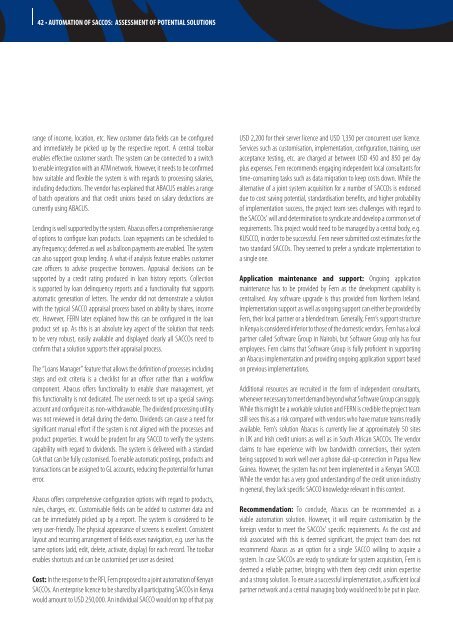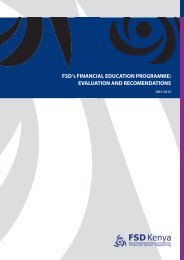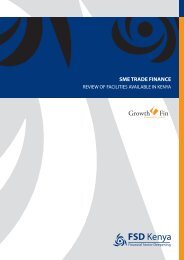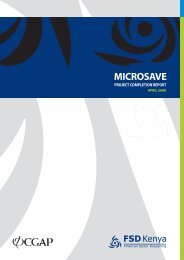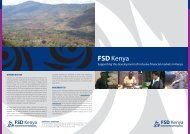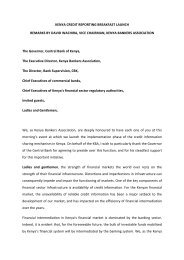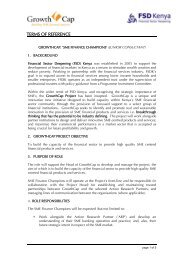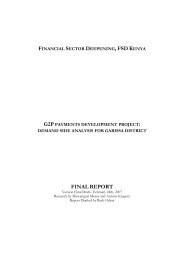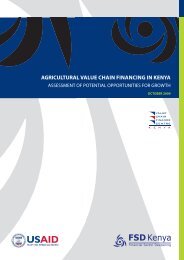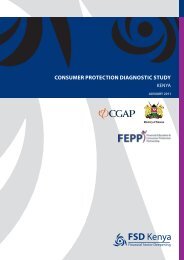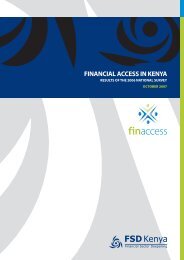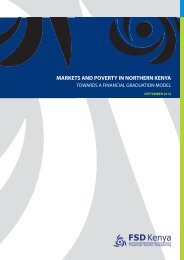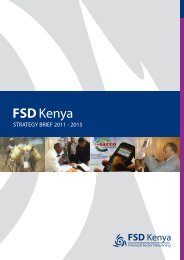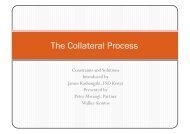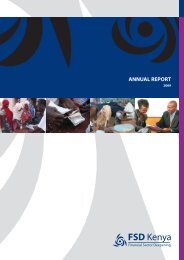Automation of SACCOs - FSD Kenya
Automation of SACCOs - FSD Kenya
Automation of SACCOs - FSD Kenya
You also want an ePaper? Increase the reach of your titles
YUMPU automatically turns print PDFs into web optimized ePapers that Google loves.
42 • AUTOMATION OF SACCOS: ASSESSMENT OF POTENTIAL SOLUTIONS<br />
range <strong>of</strong> income, location, etc. New customer data fields can be configured<br />
and immediately be picked up by the respective report. A central toolbar<br />
enables effective customer search. The system can be connected to a switch<br />
to enable integration with an ATM network. However, it needs to be confirmed<br />
how suitable and flexible the system is with regards to processing salaries,<br />
including deductions. The vendor has explained that ABACUS enables a range<br />
<strong>of</strong> batch operations and that credit unions based on salary deductions are<br />
currently using ABACUS.<br />
Lending is well supported by the system. Abacus <strong>of</strong>fers a comprehensive range<br />
<strong>of</strong> options to configure loan products. Loan repayments can be scheduled to<br />
any frequency; deferred as well as balloon payments are enabled. The system<br />
can also support group lending. A what-if analysis feature enables customer<br />
care <strong>of</strong>ficers to advise prospective borrowers. Appraisal decisions can be<br />
supported by a credit rating produced in loan history reports. Collection<br />
is supported by loan delinquency reports and a functionality that supports<br />
automatic generation <strong>of</strong> letters. The vendor did not demonstrate a solution<br />
with the typical SACCO appraisal process based on ability by shares, income<br />
etc. However, FERN later explained how this can be configured in the loan<br />
product set up. As this is an absolute key aspect <strong>of</strong> the solution that needs<br />
to be very robust, easily available and displayed clearly all <strong>SACCOs</strong> need to<br />
confirm that a solution supports their appraisal process.<br />
The “Loans Manager” feature that allows the definition <strong>of</strong> processes including<br />
steps and exit criteria is a checklist for an <strong>of</strong>ficer rather than a workflow<br />
component. Abacus <strong>of</strong>fers functionality to enable share management, yet<br />
this functionality is not dedicated. The user needs to set up a special savings<br />
account and configure it as non-withdrawable. The dividend processing utility<br />
was not reviewed in detail during the demo. Dividends can cause a need for<br />
significant manual effort if the system is not aligned with the processes and<br />
product properties. It would be prudent for any SACCO to verify the systems<br />
capability with regard to dividends. The system is delivered with a standard<br />
CoA that can be fully customised. To enable automatic postings, products and<br />
transactions can be assigned to GL accounts, reducing the potential for human<br />
error.<br />
Abacus <strong>of</strong>fers comprehensive configuration options with regard to products,<br />
rules, charges, etc. Customisable fields can be added to customer data and<br />
can be immediately picked up by a report. The system is considered to be<br />
very user-friendly. The physical appearance <strong>of</strong> screens is excellent. Consistent<br />
layout and recurring arrangement <strong>of</strong> fields eases navigation, e.g. user has the<br />
same options (add, edit, delete, activate, display) for each record. The toolbar<br />
enables shortcuts and can be customised per user as desired.<br />
Cost: In the response to the RFI, Fern proposed to a joint automation <strong>of</strong> <strong>Kenya</strong>n<br />
<strong>SACCOs</strong>. An enterprise licence to be shared by all participating <strong>SACCOs</strong> in <strong>Kenya</strong><br />
would amount to USD 250,000. An individual SACCO would on top <strong>of</strong> that pay<br />
USD 2,200 for their server licence and USD 1,350 per concurrent user licence.<br />
Services such as customisation, implementation, configuration, training, user<br />
acceptance testing, etc. are charged at between USD 450 and 850 per day<br />
plus expenses. Fern recommends engaging independent local consultants for<br />
time-consuming tasks such as data migration to keep costs down. While the<br />
alternative <strong>of</strong> a joint system acquisition for a number <strong>of</strong> <strong>SACCOs</strong> is endorsed<br />
due to cost saving potential, standardisation benefits, and higher probability<br />
<strong>of</strong> implementation success, the project team sees challenges with regard to<br />
the <strong>SACCOs</strong>’ will and determination to syndicate and develop a common set <strong>of</strong><br />
requirements. This project would need to be managed by a central body, e.g.<br />
KUSCCO, in order to be successful. Fern never submitted cost estimates for the<br />
two standard <strong>SACCOs</strong>. They seemed to prefer a syndicate implementation to<br />
a single one.<br />
Application maintenance and support: Ongoing application<br />
maintenance has to be provided by Fern as the development capability is<br />
centralised. Any s<strong>of</strong>tware upgrade is thus provided from Northern Ireland.<br />
Implementation support as well as ongoing support can either be provided by<br />
Fern, their local partner or a blended team. Generally, Fern’s support structure<br />
in <strong>Kenya</strong> is considered inferior to those <strong>of</strong> the domestic vendors. Fern has a local<br />
partner called S<strong>of</strong>tware Group in Nairobi, but S<strong>of</strong>tware Group only has four<br />
employees. Fern claims that S<strong>of</strong>tware Group is fully pr<strong>of</strong>icient in supporting<br />
an Abacus implementation and providing ongoing application support based<br />
on previous implementations.<br />
Additional resources are recruited in the form <strong>of</strong> independent consultants,<br />
whenever necessary to meet demand beyond what S<strong>of</strong>tware Group can supply.<br />
While this might be a workable solution and FERN is credible the project team<br />
still sees this as a risk compared with vendors who have mature teams readily<br />
available. Fern’s solution Abacus is currently live at approximately 50 sites<br />
in UK and Irish credit unions as well as in South African <strong>SACCOs</strong>. The vendor<br />
claims to have experience with low bandwidth connections, their system<br />
being supposed to work well over a phone dial-up connection in Papua New<br />
Guinea. However, the system has not been implemented in a <strong>Kenya</strong>n SACCO.<br />
While the vendor has a very good understanding <strong>of</strong> the credit union industry<br />
in general, they lack specific SACCO knowledge relevant in this context.<br />
recommendation: To conclude, Abacus can be recommended as a<br />
viable automation solution. However, it will require customisation by the<br />
foreign vendor to meet the <strong>SACCOs</strong>’ specific requirements. As the cost and<br />
risk associated with this is deemed significant, the project team does not<br />
recommend Abacus as an option for a single SACCO willing to acquire a<br />
system. In case <strong>SACCOs</strong> are ready to syndicate for system acquisition, Fern is<br />
deemed a reliable partner, bringing with them deep credit union expertise<br />
and a strong solution. To ensure a successful implementation, a sufficient local<br />
partner network and a central managing body would need to be put in place.


